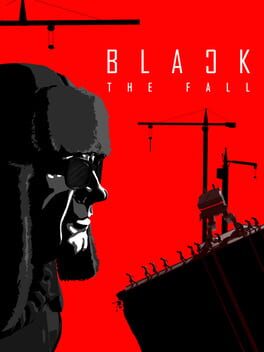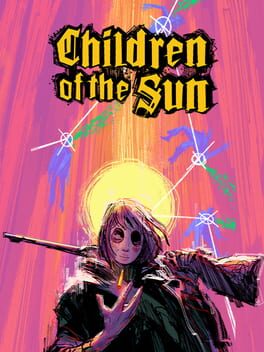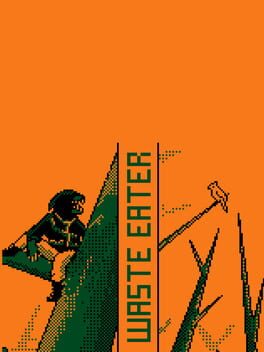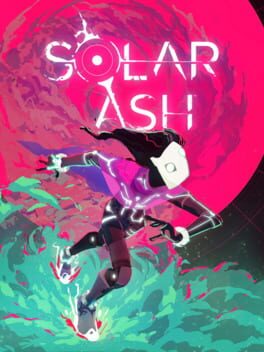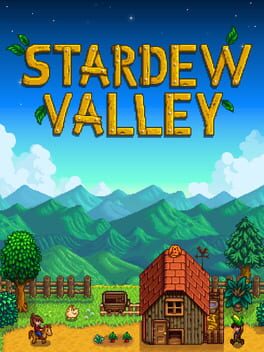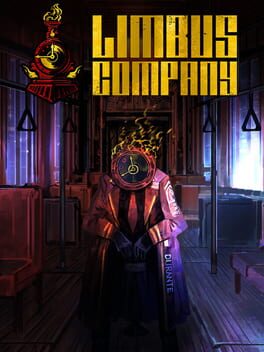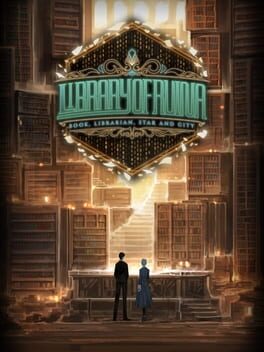jt314e
7 reviews liked by jt314e
Black the Fall
2017
Para mim NieR Replicant foi o meu primeiro contato com a obra de Nier. Já havia ouvido falar sobre NieR Automata, mas não consegui a oportunidade de jogá-lo. Após concluir esse game, me senti recompensado por ter começado por ele. Os personagens aqui têm uma coisa que falta muito nos jogos: a PERSONALIDADE. Aqui, Kainé, Emil e Weiss brilham nesse quesito. Você se importa verdadeiramente com eles e quer entender a história de vida desses personagens e como eles chegaram até ali.
Eu particularmente achei o combate do jogo simples, com alguns combos e mecânicas que você pode usar com o seu grimoire e três tipos de equipamentos que alteram a gameplay e os combos.
Em relação à história do game, é um pouco lento no início, mas quando engata mesmo, você se vê em um questionamento sobre a própria humanidade e a vida em geral. O game pega muito nessa questão, algo que me surpreendeu verdadeiramente.
Outro ponto aqui é a trilha sonora, que é uma obra de arte. É aquela trilha sonora à la The Witcher 3, que você sente o prazer de estar ouvindo, seja nas batalhas ou explorando o mundo. Provavelmente o ponto de maior destaque, foi feito com amor isso aqui.
Acredito que, se ainda não teve a oportunidade de jogar, jogue! Mas venha com a mente aberta e tenha o mais importante: paciência. É um jogo de um ritmo mais lento, com textos que você tem que dedicar sua atenção para entender e absorver o que ele quer te passar.
5/5
PS: Kainé eu te amo! KKKKKK
Eu particularmente achei o combate do jogo simples, com alguns combos e mecânicas que você pode usar com o seu grimoire e três tipos de equipamentos que alteram a gameplay e os combos.
Em relação à história do game, é um pouco lento no início, mas quando engata mesmo, você se vê em um questionamento sobre a própria humanidade e a vida em geral. O game pega muito nessa questão, algo que me surpreendeu verdadeiramente.
Outro ponto aqui é a trilha sonora, que é uma obra de arte. É aquela trilha sonora à la The Witcher 3, que você sente o prazer de estar ouvindo, seja nas batalhas ou explorando o mundo. Provavelmente o ponto de maior destaque, foi feito com amor isso aqui.
Acredito que, se ainda não teve a oportunidade de jogar, jogue! Mas venha com a mente aberta e tenha o mais importante: paciência. É um jogo de um ritmo mais lento, com textos que você tem que dedicar sua atenção para entender e absorver o que ele quer te passar.
5/5
PS: Kainé eu te amo! KKKKKK
Children of the Sun
2024
Children Of The Sun is a highly stylised puzzle shooter that takes the bullet time moments from Sniper Elite and develops the idea into a full game. Most levels consist of scouting the location and marking enemies before executing a Wanted style bullet bending blood bath.
The story is one of revenge that sees the protagonist taking her anger out on a cult that left her family in ruin and death. Children Of The Sun presents its story via brief comic style cutscenes providing short insights into the history of the main character and their relationship to the cult. Most levels are separate from the story and just see you taking down stronger and stronger outpost as you get ever closer to the cult leader. Occasionally however there will be a level that directly progress the story but these are few and far between and only near the end of the game.
Gameplay wise Children Of The Sun strives to take a small idea and stretches it as far as creatively possible. This leads to some fun and unique concepts that don't overstay their welcome. With the core mechanic being bullet time this idea develops and introduces bullet redirection, slow-mo and high caliber speed to tackle a variety of different enemy types and scenarios. Latter gameplay becomes more of a puzzle game as you try to solve who to kill first and who to keep alive for a latter redirection. I did find this to become quite tedious in particularly the last 2 levels as I got relative stuck for extended periods of time due to either poor puzzle execution or long distance aim (I was playing on my Steam Deck and may have had better luck with a mouse).
One of the biggest drawbacks I found was the mini games that were randomly thrown in. These were not good and felt really out of place. Thankfully there wasn't many and only 1 was particularly difficult, but I feel it would have been a better experience with the removed completely.
The mood and atmosphere for Children Of The Sun is great and can be particularly satisfying at times. However there doesn't seem to be much keeping me engaged. You can battle other players for a high score but apart from that Children Of The Sun feels very one and done.
The story is one of revenge that sees the protagonist taking her anger out on a cult that left her family in ruin and death. Children Of The Sun presents its story via brief comic style cutscenes providing short insights into the history of the main character and their relationship to the cult. Most levels are separate from the story and just see you taking down stronger and stronger outpost as you get ever closer to the cult leader. Occasionally however there will be a level that directly progress the story but these are few and far between and only near the end of the game.
Gameplay wise Children Of The Sun strives to take a small idea and stretches it as far as creatively possible. This leads to some fun and unique concepts that don't overstay their welcome. With the core mechanic being bullet time this idea develops and introduces bullet redirection, slow-mo and high caliber speed to tackle a variety of different enemy types and scenarios. Latter gameplay becomes more of a puzzle game as you try to solve who to kill first and who to keep alive for a latter redirection. I did find this to become quite tedious in particularly the last 2 levels as I got relative stuck for extended periods of time due to either poor puzzle execution or long distance aim (I was playing on my Steam Deck and may have had better luck with a mouse).
One of the biggest drawbacks I found was the mini games that were randomly thrown in. These were not good and felt really out of place. Thankfully there wasn't many and only 1 was particularly difficult, but I feel it would have been a better experience with the removed completely.
The mood and atmosphere for Children Of The Sun is great and can be particularly satisfying at times. However there doesn't seem to be much keeping me engaged. You can battle other players for a high score but apart from that Children Of The Sun feels very one and done.
Waste Eater
2023
Mais uma obra-prima de Lucas Pope, Obra Dinn é um notório tributo ao jogo de tabuleiro Detetive.
A narrativa, baseada no livro de anotações do protagonista, é apresentada de forma anacrônica e confusa propositalmente, e cabe ao jogador montar o puzzle.
Confesso que não é um jogo pra todo mundo porque é relativamente difícil e pode causar frustração pra completá-lo, mas com certeza fica mais divertido se jogar com um grupo de amigos e um caderno para anotações e rascunhos (muito importante!!!).
Eu ainda não peguei o final bom mas ainda tenho vontade de tentar novamente em breve.
A narrativa, baseada no livro de anotações do protagonista, é apresentada de forma anacrônica e confusa propositalmente, e cabe ao jogador montar o puzzle.
Confesso que não é um jogo pra todo mundo porque é relativamente difícil e pode causar frustração pra completá-lo, mas com certeza fica mais divertido se jogar com um grupo de amigos e um caderno para anotações e rascunhos (muito importante!!!).
Eu ainda não peguei o final bom mas ainda tenho vontade de tentar novamente em breve.
Solar Ash
2021
For HeartMachine's second ever game, it hits that nice sweet spot of blaring ambition and drive to create something special and impactful, and ever just barely mitigated lack of experience from early and/or unrestrained game devs that mostly remains out of the way enough to appreciate what their vision can create. Realistically my review can be summated by this (unnecessarily long) sentence, however ignoring the specifics of why this game slaps is doing an injustice to both the ingenuity of the developers and your, the reader's, understanding of the game from an outside perspective.
So, just to keep my praise contained, I will follow the game's example and start with the negatives. Learning to control your character in this game is a requirement to experiencing the killer back 2/3rds of the game, and is both improperly communicated and surprisingly complex to master. This is at it's core a platformer, a very strange movement focused version of a platformer, but the focus is still on overcoming challenges relating to traversing platforms and so you need somewhat of an ability to perform that task, plus mastering the movement always unlocks more enjoyment in performing that task (also I've heard this is very similar to Jet Set Radio, but I haven't played that yet so idk). The worst moments of the game are when it forces the camera into a scripted sequence, or the game removes all of your abilities beyond walking for story segments. These scripted experiential moments would be great if either the game developed it's story beyond what it already is, or this was not a movement focused game where an inability to move shunts your enjoyment. Next I've got a pet peeve with hidden collectibles requiring exploration in games designed to blitz past segments of the world, however the game is designed to feel like you are exploring the Ultravoid despite the very linear platforming level design so whatever.
Very few things feel better than running around the Ultravoid at full speeds, chaining dashes following jumps and grapples, pathing along the plasma laid out between and through the environment. The major limitation on your character at any given moment is your inability to easily turn, however it's rarely an issue given proper pathfinding and proper uses of mechanics. The game's first and foremost goal is to make you feel like a voidrunner (hey it's the thing on the last line) as it assumes you must do, and I almost always felt like a dexterous warrior too fast to be hit and too fast to ever stop. The game makes this assumption as it does not ever enforce a time limit on your experience, and so it expects your interactivity to feel fast to reinforce your character's mad dash to save their planet against inevitability.
But on that note, the level design is surpringly well integrated into the absolute dexterity of your capabilities in surprisingly subtle ways. Paths are always wide enough to allow variance in progression, but narrow enough so you gotta bonk your head a few times. Environmental mechanics such as railgrinding or grappling were a bit finicky but served to throw mix-ups into the monotony of running around constantly, and worked particularly well to introduce more linear segments following open exploration. The open segments felt simultaneously expansive for mechanical freedom and limiting in mechanical intrigue, I like myself some boundless clouds but not all the time. The shadow of the colossus style bosses mixed up the progression platform puzzles into further time-trial-esque tests of ability. The highlight for me is world/chapter/location 5, as the large flat plateau introduces a simple radiation hazard testing your dexterity in traversal between points of safety as a timer slowly ticks towards instant death. Which the death is just the right balance of punishing and a non-issue, the only change brought by death is requiring to hit a box and moving back to an earlier checkpoint in your path.
Speaking of, the path looks weirdly delightful in an simplistic off-cartoon sort of way you only really get out of generative rendering. This game somehow has a very similar combined style to both Risk of Rain 2 (if it was cohesive and realised (for lack of my own vocabulary)) and Hyper Light Drifter. Switching between the flat and typically rounded open vistas or twisting levels into moments of high-contrast 2D animation elevates the visual identity of this game from Hyper Light Drifter, whilst becoming something uniquely characterised of it's own. My only complaint was that the game was so visual pleasing, the markers or points of interest were difficult to differentiate amongst the painting.
The music does not follow in the art style however, as it prefers to directly iterate on Hyper Light Drifter's soundtrack. I personally prefer this soundtrack, however I'm comparing Windows 10 to Windows 11 here, it's basically more of the same with minor tweaks (which is downplaying the effort spent on it's creation, however this is the result I experienced). Also, mainly cause I don't know where else to mention this, the voice acting is surprisingly good and well edited into the voice logs scattered about the Ultravoid.
And finally, for the first time in HeartMachine's history, this game has a narrative. At first I felt as if the studio's strength in telling stories lay in not telling them directly, as the narrative in the first 2 chapters wasn't very interesting, however those parts they weren't saying yet were told later and damn they can execute. Unfortunately though, the main character remains as boring to listen to as possible the entire way through, however that boredom is skewed by the story presented. HeartMachine understands the unique method of storytelling you can perform through interactivity, and so I must apologise for underestimating the intentionally obvious optional lore collectibles as they are as integral to the story as the actual events of the narrative. There was not a single time where my actions did not contribute towards the story being told, as the themes relating to the indifference of existence, possible meanings of consciousness in existence, and grief in these larger contexts pervey every fiber of this game's creation (yes, I'd argue even just being afk at a checkpoint counts in this context). I don't know if you can tell this story in a different medium, or even under a different storyteller, and so I struggle to say if anyone else may have the same experience I did.
This is an amazing second go around for HeartMachine, though it took me a fair chunk of the run time to realise exactly what I was in for. This felt like a lesser version of walking into Everything Everywhere All At Once for the first time and expecting a fun time with an alright narrative, then being very sorely mistaken. The start of the game will probably turn people away, and despite my praise I have to recommend that you let it turn you away, I don't think this game will work with everyone. Some iteration on the mechanics, pacing, soundtrack, moments of gameplay, and dialogue would definitely improve this game from it's creators' lack of experience, however these negative elements never ruined or even showed up often in my experience. I love movement games so my opinion is skewed for this particular matter, but this may be one of my top 5 games of the decade.
Really makes you feel like the endless matter compounding ash into clouds under the weight of a star's berth
So, just to keep my praise contained, I will follow the game's example and start with the negatives. Learning to control your character in this game is a requirement to experiencing the killer back 2/3rds of the game, and is both improperly communicated and surprisingly complex to master. This is at it's core a platformer, a very strange movement focused version of a platformer, but the focus is still on overcoming challenges relating to traversing platforms and so you need somewhat of an ability to perform that task, plus mastering the movement always unlocks more enjoyment in performing that task (also I've heard this is very similar to Jet Set Radio, but I haven't played that yet so idk). The worst moments of the game are when it forces the camera into a scripted sequence, or the game removes all of your abilities beyond walking for story segments. These scripted experiential moments would be great if either the game developed it's story beyond what it already is, or this was not a movement focused game where an inability to move shunts your enjoyment. Next I've got a pet peeve with hidden collectibles requiring exploration in games designed to blitz past segments of the world, however the game is designed to feel like you are exploring the Ultravoid despite the very linear platforming level design so whatever.
Very few things feel better than running around the Ultravoid at full speeds, chaining dashes following jumps and grapples, pathing along the plasma laid out between and through the environment. The major limitation on your character at any given moment is your inability to easily turn, however it's rarely an issue given proper pathfinding and proper uses of mechanics. The game's first and foremost goal is to make you feel like a voidrunner (hey it's the thing on the last line) as it assumes you must do, and I almost always felt like a dexterous warrior too fast to be hit and too fast to ever stop. The game makes this assumption as it does not ever enforce a time limit on your experience, and so it expects your interactivity to feel fast to reinforce your character's mad dash to save their planet against inevitability.
But on that note, the level design is surpringly well integrated into the absolute dexterity of your capabilities in surprisingly subtle ways. Paths are always wide enough to allow variance in progression, but narrow enough so you gotta bonk your head a few times. Environmental mechanics such as railgrinding or grappling were a bit finicky but served to throw mix-ups into the monotony of running around constantly, and worked particularly well to introduce more linear segments following open exploration. The open segments felt simultaneously expansive for mechanical freedom and limiting in mechanical intrigue, I like myself some boundless clouds but not all the time. The shadow of the colossus style bosses mixed up the progression platform puzzles into further time-trial-esque tests of ability. The highlight for me is world/chapter/location 5, as the large flat plateau introduces a simple radiation hazard testing your dexterity in traversal between points of safety as a timer slowly ticks towards instant death. Which the death is just the right balance of punishing and a non-issue, the only change brought by death is requiring to hit a box and moving back to an earlier checkpoint in your path.
Speaking of, the path looks weirdly delightful in an simplistic off-cartoon sort of way you only really get out of generative rendering. This game somehow has a very similar combined style to both Risk of Rain 2 (if it was cohesive and realised (for lack of my own vocabulary)) and Hyper Light Drifter. Switching between the flat and typically rounded open vistas or twisting levels into moments of high-contrast 2D animation elevates the visual identity of this game from Hyper Light Drifter, whilst becoming something uniquely characterised of it's own. My only complaint was that the game was so visual pleasing, the markers or points of interest were difficult to differentiate amongst the painting.
The music does not follow in the art style however, as it prefers to directly iterate on Hyper Light Drifter's soundtrack. I personally prefer this soundtrack, however I'm comparing Windows 10 to Windows 11 here, it's basically more of the same with minor tweaks (which is downplaying the effort spent on it's creation, however this is the result I experienced). Also, mainly cause I don't know where else to mention this, the voice acting is surprisingly good and well edited into the voice logs scattered about the Ultravoid.
And finally, for the first time in HeartMachine's history, this game has a narrative. At first I felt as if the studio's strength in telling stories lay in not telling them directly, as the narrative in the first 2 chapters wasn't very interesting, however those parts they weren't saying yet were told later and damn they can execute. Unfortunately though, the main character remains as boring to listen to as possible the entire way through, however that boredom is skewed by the story presented. HeartMachine understands the unique method of storytelling you can perform through interactivity, and so I must apologise for underestimating the intentionally obvious optional lore collectibles as they are as integral to the story as the actual events of the narrative. There was not a single time where my actions did not contribute towards the story being told, as the themes relating to the indifference of existence, possible meanings of consciousness in existence, and grief in these larger contexts pervey every fiber of this game's creation (yes, I'd argue even just being afk at a checkpoint counts in this context). I don't know if you can tell this story in a different medium, or even under a different storyteller, and so I struggle to say if anyone else may have the same experience I did.
This is an amazing second go around for HeartMachine, though it took me a fair chunk of the run time to realise exactly what I was in for. This felt like a lesser version of walking into Everything Everywhere All At Once for the first time and expecting a fun time with an alright narrative, then being very sorely mistaken. The start of the game will probably turn people away, and despite my praise I have to recommend that you let it turn you away, I don't think this game will work with everyone. Some iteration on the mechanics, pacing, soundtrack, moments of gameplay, and dialogue would definitely improve this game from it's creators' lack of experience, however these negative elements never ruined or even showed up often in my experience. I love movement games so my opinion is skewed for this particular matter, but this may be one of my top 5 games of the decade.
Really makes you feel like the endless matter compounding ash into clouds under the weight of a star's berth
It’s official. Silent Hill is no longer the name of a franchise set in or dealing with the dark history of an eponymous fictional town in Maine, left forever tainted by the twisted machinations of a cult and where sinners and the damaged alike find themselves drawn to face judgement for their actions or potential healing for their deep-seated emotional wounds respectively. It's now a label Konami can throw on any horror project that deals with themes of trauma, grotesque monsters, and an otherworld concept for brand recognition. Gone is the connective tissue of location and lore that previously unified the games together. A similar visual style is really all that remains.
The Short Message isn't the outing that revealed this to me. It was a suspicion I had as soon as titles like “f” were announced, and had been already confirmed for me ahead of time with the launch of the shameful Ascension which I abandoned keeping up with near the start of 2024 as a form of mercy for myself. I'm not going to lie, that's been a tough pill to swallow as a longtime fan. Yet, I did my best to go into this with an open mind though, knowing full well from what little blurbs I had seen online (I've actually avoided reading a lot of your reviews beforehand to remain as blind and uninfluenced as possible) that this was going to most likely be an experience tailored towards attracting and pandering to a new, more modern audience. That's exactly what I got.
Naturally, as a result I hated this at first. The inexplicit symbolism that defined its predecessors has been stripped away entirely in favor of blunt, in-your-face storytelling perfectly suited for this artless influencer era where everyone gets their opinions from whatever rich internet personality is tactlessly screaming the loudest, and the dialogue is the exact type of obliviously pretentious drivel one would expect from your average wannabe intellectual teenager or college-aged Twitter (X?) addict. It's almost completely devoid of real depth and seems painfully unaware that nothing it's speaking on hasn't been covered elsewhere, and better there.
That's devastating. Genuinely hurts to witness. Miraculously a strange thing happens around its second of three chapters, however. The writers suddenly stop beating you over the head quite as hard with the subject matter (the amount of times the number for the suicide prevention hotline is thrown onscreen...) and begin letting each character's pain speak for itself. Meanwhile a big plot revelation divulges how the protagonist is as much of a perpetrator as she is a victim, in the same vein as the James Sunderlands and Murphy Pendletons prior. The tale shockingly finds its groove and gains a trace of that previously sorely missing complexity, even if only in part because its topics are sure to strike a chord with anyone ever negatively impacted by the rise of social media (so basically just about everyone) or wasn't the most popular in high school. There's even a nice, if ultimately highly flawed, stab taken at exploring the concept of generational curses. As someone who was afflicted by many of the same things as the leading lady for years, that ending certainly tugged on the heartstrings as well.
The gameplay side of the package also suffers from feeling a tad too overly simplistic due to the demographic being pursued here, albeit to a slightly higher degree. TSM's whole concept seems to be "what if P.T., but it's not a puzzle?" You progress through its looping scenario and setting in a very linear, directed manner with no room to mess up or ponder over what to do since whatever you need to collect or interact with next is always clearly defined with a visible icon on the screen. This would almost be a straight "walking simulator" were it not for the chase sequences, survival-horror's current favorite trend that it's been stuck on for a while now thanks to Amnesia. These moments can definitely be intense, but cause the package to run into the same problem as Shattered Memories where despite the fantastic atmosphere and occasional well done jump scare it's not long before any sense of fear quickly dissipates from most of the runtime because you become fully aware of when you're truly in danger or not. Still, I found myself fairly entertained regardless and genuinely think that last sprint through the larger maze area is pretty dang good at getting the heart racing.
And the end of the day, yes this is undeniably a dumbed-down version of the beloved property. If you don't like it, well that's probably because it's not meant for you. This is Silent Hill aimed at a new, younger generation. A crowd that, let's be honest, has been programmed to require all their information and successes be spoon-fed to them. That being said, maybe it's the fact that this is a totally free experience (that got a cool stealth release) or simply because I'm not that far removed from the market they were shooting for, but if this IS the future of the series then I'm onboard. Although somewhat begrudgingly. In spite of my initial misgivings, Short Message ultimately won me over by the strength of its affecting, if severely ham-fisted narrative and competent action/scares. I can't wait to find out if all that stuff with the cherry blossoms ties into “f” in an interesting way either. So in conclusion, against the odds this brief glimpse into what's next for my personal favorite staple in the genre has left me thinking the kids might be alright in the end.
7.5/10
The Short Message isn't the outing that revealed this to me. It was a suspicion I had as soon as titles like “f” were announced, and had been already confirmed for me ahead of time with the launch of the shameful Ascension which I abandoned keeping up with near the start of 2024 as a form of mercy for myself. I'm not going to lie, that's been a tough pill to swallow as a longtime fan. Yet, I did my best to go into this with an open mind though, knowing full well from what little blurbs I had seen online (I've actually avoided reading a lot of your reviews beforehand to remain as blind and uninfluenced as possible) that this was going to most likely be an experience tailored towards attracting and pandering to a new, more modern audience. That's exactly what I got.
Naturally, as a result I hated this at first. The inexplicit symbolism that defined its predecessors has been stripped away entirely in favor of blunt, in-your-face storytelling perfectly suited for this artless influencer era where everyone gets their opinions from whatever rich internet personality is tactlessly screaming the loudest, and the dialogue is the exact type of obliviously pretentious drivel one would expect from your average wannabe intellectual teenager or college-aged Twitter (X?) addict. It's almost completely devoid of real depth and seems painfully unaware that nothing it's speaking on hasn't been covered elsewhere, and better there.
That's devastating. Genuinely hurts to witness. Miraculously a strange thing happens around its second of three chapters, however. The writers suddenly stop beating you over the head quite as hard with the subject matter (the amount of times the number for the suicide prevention hotline is thrown onscreen...) and begin letting each character's pain speak for itself. Meanwhile a big plot revelation divulges how the protagonist is as much of a perpetrator as she is a victim, in the same vein as the James Sunderlands and Murphy Pendletons prior. The tale shockingly finds its groove and gains a trace of that previously sorely missing complexity, even if only in part because its topics are sure to strike a chord with anyone ever negatively impacted by the rise of social media (so basically just about everyone) or wasn't the most popular in high school. There's even a nice, if ultimately highly flawed, stab taken at exploring the concept of generational curses. As someone who was afflicted by many of the same things as the leading lady for years, that ending certainly tugged on the heartstrings as well.
The gameplay side of the package also suffers from feeling a tad too overly simplistic due to the demographic being pursued here, albeit to a slightly higher degree. TSM's whole concept seems to be "what if P.T., but it's not a puzzle?" You progress through its looping scenario and setting in a very linear, directed manner with no room to mess up or ponder over what to do since whatever you need to collect or interact with next is always clearly defined with a visible icon on the screen. This would almost be a straight "walking simulator" were it not for the chase sequences, survival-horror's current favorite trend that it's been stuck on for a while now thanks to Amnesia. These moments can definitely be intense, but cause the package to run into the same problem as Shattered Memories where despite the fantastic atmosphere and occasional well done jump scare it's not long before any sense of fear quickly dissipates from most of the runtime because you become fully aware of when you're truly in danger or not. Still, I found myself fairly entertained regardless and genuinely think that last sprint through the larger maze area is pretty dang good at getting the heart racing.
And the end of the day, yes this is undeniably a dumbed-down version of the beloved property. If you don't like it, well that's probably because it's not meant for you. This is Silent Hill aimed at a new, younger generation. A crowd that, let's be honest, has been programmed to require all their information and successes be spoon-fed to them. That being said, maybe it's the fact that this is a totally free experience (that got a cool stealth release) or simply because I'm not that far removed from the market they were shooting for, but if this IS the future of the series then I'm onboard. Although somewhat begrudgingly. In spite of my initial misgivings, Short Message ultimately won me over by the strength of its affecting, if severely ham-fisted narrative and competent action/scares. I can't wait to find out if all that stuff with the cherry blossoms ties into “f” in an interesting way either. So in conclusion, against the odds this brief glimpse into what's next for my personal favorite staple in the genre has left me thinking the kids might be alright in the end.
7.5/10
